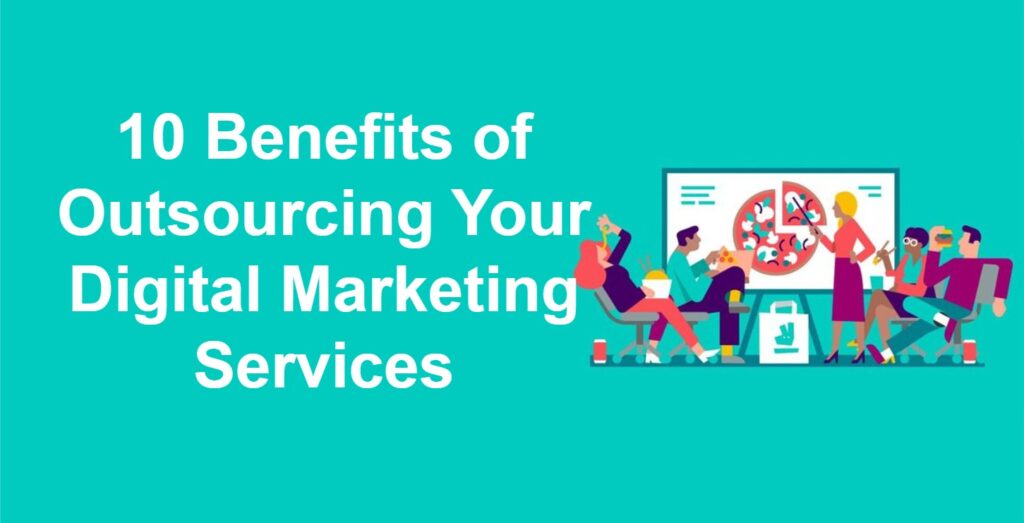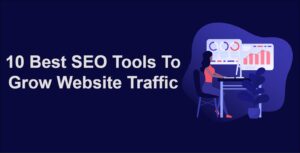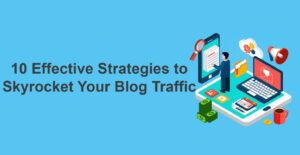In today’s fast-paced business environment, digital marketing has become a cornerstone of success for companies across industries. A robust digital marketing strategy is essential, from building brand awareness to driving leads and conversions.
However, managing all aspects of digital marketing in-house can be daunting, especially for small and medium-sized businesses with limited resources.
This is where outsourcing your digital marketing services comes into play. This comprehensive guide delves into the various benefits of outsourcing your digital marketing efforts and how it can be a game-changer for your business.
Outsourcing your digital marketing services can be a strategic decision that drives growth, enhances brand visibility, and increases revenue. By tapping into professionals’ expertise, you can confidently navigate the complexities of the digital landscape. Evaluate potential agencies carefully, align your goals, and embark on a journey toward digital marketing success.
What are digital marketing services?
Digital marketing services are the lifeblood of the modern business world, harnessing the immense power of the digital realm to connect with audiences, drive engagement, and promote brands or products. These services are an extensive toolkit of strategies and techniques enabling businesses to thrive online.
At the heart of digital marketing lies Search Engine Optimization (SEO), the art and science of optimizing websites to rank higher in search engine results. SEO enhances visibility, drawing organic, non-paid traffic to your website. It’s the cornerstone for a successful digital presence.
Content Marketing, another pivotal service, is creating compelling, relevant content. From informative blog posts to engaging videos and eye-catching infographics, content marketing captures the essence of your brand and captivates your target audience.
Social Media Marketing is a dynamic arena where businesses leverage platforms like Facebook, Instagram, Twitter, and LinkedIn to engage with customers. Strategies encompass both organic content creation and paid advertising efforts.
Pay-per-click (PPC) Advertising empowers brands to position themselves strategically through ads on search engines and other platforms. Advertisers pay per click, making it a cost-effective way to reach potential customers.
Email Marketing is a personalized approach, using emails to connect with potential and existing customers. Newsletters, promotions, and tailored messages make it a potent tool in any marketing arsenal.
Influencer Marketing is a burgeoning strategy that partners with social media influencers to reach their extensive follower base. These influencers endorse products or services, offering a unique path to authenticity and trust.
Online Advertising, Video Marketing, Affiliate Marketing, and Mobile Marketing are additional services in the digital marketing toolbox, each with its unique focus and channel.
Harnessing the power of Analytics and Data Analysis, digital marketers measure campaign effectiveness, enabling data-driven decisions and optimization. Conversion Rate Optimization (CRO) ensures your website or landing page maximizes the percentage of visitors who take desired actions.
Moreover, with Marketing Automation, tasks and workflows are streamlined through software, automating everything from email campaigns to lead nurturing, making marketing smarter and more efficient.
Why Digital marketing is important for businesses
In today’s business landscape, digital marketing is not just important; it’s essential for reaching, engaging, and growing your customer base. It empowers businesses to connect with the right audience, understand customer behavior, and stay competitive in a rapidly evolving digital world.
Its importance is evident in various aspects that drive growth and success:
Global Reach: Digital marketing transcends geographical boundaries, allowing businesses to reach a global audience. With the right strategies, you can connect with potential customers worldwide.
Cost-Effective: Digital marketing is often more cost-effective than traditional advertising methods. You can allocate your budget more efficiently and tailor campaigns to reach specific demographics.
Measurable Results: Unlike traditional marketing, digital marketing provides robust analytics and data. You can track the performance of your campaigns in real time, allowing you to make informed decisions and adjustments as needed.
Targeted Marketing: Digital marketing enables precise targeting. You can focus on reaching the audience most likely interested in your products or services, leading to higher conversion rates.
Enhanced Customer Engagement: Social media, email marketing, and other digital channels allow businesses to engage directly with customers, fostering relationships and building loyalty.
Competitive Edge: Staying relevant in a competitive market requires a strong online presence. Effective digital marketing can help you stand out, even in crowded industries.
Brand Building: A consistent online presence helps in brand building. It enhances brand visibility and recognition, which is crucial for long-term success.
24/7 Availability: Your online presence is always available, allowing customers to interact with your brand conveniently.
Data-Driven Decision-Making: The data collected through digital marketing provides valuable insights that guide strategic decisions, helping businesses evolve and improve their offerings.
The Changing Landscape of Digital Marketing
Digital marketing has evolved significantly over the years, encompassing a wide range of strategies and tactics. From search engine optimization (SEO) to social media marketing, content creation, email marketing, and pay-per-click (PPC) advertising, the scope of digital marketing is vast. Staying up-to-date with the latest trends and technologies requires expertise, time, and resources.
The Complexities of In-House Digital Marketing
While some businesses opt to manage their digital marketing efforts in-house, this approach often presents challenges:
1. Resource Constraints
Smaller businesses may lack the manpower and expertise required to execute a comprehensive digital marketing strategy. Hiring and training an in-house team can be expensive and time-consuming.
2. Constant Learning Curve
Digital marketing is a dynamic field, with algorithms, platforms, and best practices constantly evolving. Staying current requires continuous learning and adaptation.
3. Diverse Skill Set
Effective digital marketing requires expertise in various areas, such as content creation, data analysis, and campaign management. It can be challenging to find individuals with all the necessary skills.
4. Time-Consuming
Managing digital marketing internally can take time away from core business operations. Business owners and employees may find themselves stretched thin.
Outsourcing Your Digital Marketing Services
Outsourcing your digital marketing services to a specialized agency can provide numerous advantages:
1. Access to Expertise
Digital marketing agencies are staffed with professionals who specialize in different aspects of digital marketing. This expertise ensures that your campaigns are executed effectively.
2. Cost-Effectiveness
Outsourcing can be more cost-effective than hiring and training an in-house team. You pay for the services you need, without the overhead costs of full-time employees.
3. Focus on Core Competencies
By outsourcing digital marketing, you can focus on what you do best—running your business. This allows you to allocate resources where they are most needed.
4. Stay Current with Trends
Digital marketing agencies stay abreast of the latest industry trends and technologies. They can implement cutting-edge strategies that may not be feasible for an in-house team.
5. Scalability
As your business grows, your digital marketing needs may change. Outsourcing allows you to scale your efforts up or down as required, without the hassle of hiring or downsizing.
6. Faster Results
Experienced digital marketing agencies have tried-and-tested strategies that can lead to faster and more effective results compared to a learning curve associated with in-house efforts.
Addressing Common Concerns
Despite the benefits, some businesses have reservations about outsourcing their digital marketing services. Let’s address a few common concerns:
Loss of Control
One concern is the perceived loss of control over marketing efforts. However, reputable agencies work collaboratively with businesses, providing regular updates and insights.
Lack of Understanding of the Business
Critics may argue that an external agency won’t understand the business as well as an in-house team. However, agencies invest time in understanding their clients’ industries and objectives.
Cost
While cost is a consideration, it’s essential to weigh it against the potential return on investment (ROI). A well-executed digital marketing strategy can yield substantial ROI.
Choosing the Right Digital Marketing Agency
Selecting the right agency is crucial for a successful partnership. Consider these factors when evaluating potential partners:
1. Experience and Expertise
Look for agencies with a proven track record and expertise in the specific digital marketing services you require.
2. Client References
Request references and case studies from previous clients to gauge the agency’s performance and client satisfaction.
3. Alignment with Goals
Choose an agency that understands your business goals and can tailor strategies to align with your objectives.
4. Transparent Communication
Clear and open communication is vital. Ensure the agency provides regular updates and insights into your campaigns’ performance.
5. Customized Solutions
Avoid one-size-fits-all solutions. A reputable agency should customize strategies based on your business’s unique needs.
Outsourcing Digital Marketing Advantages and Disadvantages
| Advantages of Outsourcing Marketing | Disadvantages of Outsourcing Marketing |
|---|---|
| Expertise: Access to specialized marketing skills and knowledge. | Loss of Control: Limited control over the outsourced activities and strategies. |
| Cost Savings: Potentially more cost-effective than hiring and training an in-house team. | Communication Challenges: Remote teams may face communication barriers or time zone differences. |
| Time Efficiency: Allows your team to focus on core business functions. | Quality Concerns: Outsourced quality may not always meet expectations or brand standards. |
| Scalability: Easily scale marketing efforts up or down as needed. | Data Security: Sharing sensitive information with third parties could pose security risks. |
| Fresh Perspective: Outsiders can provide new ideas and insights. | Dependency: Overreliance on an external party for critical marketing activities. |
| Access to Tools: Access to advanced marketing tools and technologies. | Cultural Mismatch: Outsourced team might not fully understand your company culture. |
| Reduced Hiring Hassles: Avoid recruitment, onboarding, and training processes. | Long-term Costs: Initial cost savings could be offset by ongoing outsourcing fees. |
| Quick Implementation: Start marketing campaigns faster with an experienced team. | Lack of Alignment: Outsourced team may not fully align with your business goals. |





